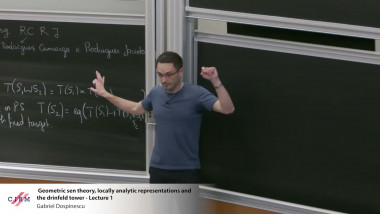Front initiation in continuous neural fields
By Grégory Faye
Appears in collection : 2022 - T1 - WS2 - Mathematical modeling and statistical analysis in neuroscience
In this talk, I shall present some recent and ongoing results regarding the question of front initiation in continuous scalar neural fields. The problem is to characterize, given a localized initial condition, the long-time dynamic of the solution of the associated Cauchy problem. When the underlying kinetics of the homogenous problem is of bistable type with two stables states, say $u = 0$ and $u = 1$, with $u = 1$ more favorable than $u = 0$, one expects that small (in some appropriate sense) localized initial condition will lead to uniform convergence of the solution towards $u = 0$ (this is referred to as extinction) and large localized initial condition will lead to convergence on compact sets towards $u = 1$ (this is referred to as propagation). The identification of a threshold between extinction/propagation within a given one parameter family of localized initial condition is a well-known difficult problem, even for local bistable reaction-diffusion equations, and I will explain some progress made in that direction for two types of continuous neural fields: the Amari-Wilson-Cowan equation and the nonlocal Nagumo equation.











![[1246] The model theory of perfectoid fields](/media/cache/video_light/uploads/video/SeminaireBourbaki.png)
